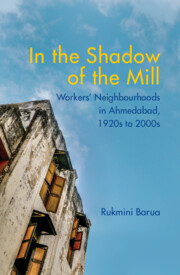4 - Civil Society, ‘Social Work’ and Political Mediation
Published online by Cambridge University Press: 15 June 2022
Summary
Underlying many of the previously discussed practices of mediation was the notion of social work or ‘seva’—the TLA's struggle for social uplift of the working class or, for that matter, the investments made by bootleggers and other ‘anti-social’ elements in social and cultural affairs of the industrial neighbourhoods. Seva as an ethical and moral tool for building associational cultures was of course not unique to Ahmedabad. What was interesting, however, was the ways in which seva in this case was imbricated in political and electoral scales and rhythms. Built into this notion of ‘seva’ was a certain idea of reciprocity—social service played a crucial role in building constituencies, in terms of both electoral and social support.
Ahmedabad has historically had a rich tradition of voluntary associations. The city's civil society has included, at various points in history, the once powerful traders’ mahajans, or guilds, pol panchs (neighbourhood organisations), Gandhian social service organisations, influential trade unions and, presently, the large array of non-governmental organisations (NGOs) of varying degrees of influence and of diverse political persuasions. Social service in contemporary Ahmedabad, like elsewhere, spans a wide range—from bigger NGOs with a national presence and substantial foreign funding, to organisations governed by religious trusts, and still others who operate at a very modest scale. Discussions on civil society in Ahmedabad have followed certain key thematic thrusts. One focuses on the narrative of empowerment and social change. This details, for instance, the successes of civil society organisations in offering possibilities for organising the working poor. Another significant strand of literature identifies civic engagement as a means through which ‘communal passions’ could be contained. The writings on SEWA, for example, highlight the potential that civil society offers as both a way of providing security for a largely casualised workforce as well as for maintaining peace in a conflict city. Furthermore, other critical works on the subject have focused on the complicity and the silence that was maintained by the civil society during the violence of 2002. This has been understood alternatively as a ‘politicisation’ of civil society, of the significant appeal of Hindutva ideology to certain segments of the civil society or in terms of coercion and intimidation by the BJP-led state government, which effectively silenced any serious critique of its role in the violence.
- Type
- Chapter
- Information
- In the Shadow of the MillWorkers' Neighbourhoods in Ahmedabad, 1920s to 2000s, pp. 134 - 172Publisher: Cambridge University PressPrint publication year: 2022



